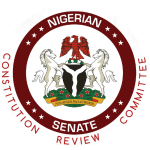Section 90. Establishment of House of assembly for each State
There shall be a House of Assembly for each of the States of the Federation.
Section 91. Composition of the House of Assembly
Subject to the provisions of this Constitution, a House of Assembly of a State shall consist of three or four times the number of seats which that State has in the House of Representatives divided in a way to reflect, as far as possible nearly equal population:
Provided that a House of Assembly of a State shall consist of not less than twenty-four and not more than forty members.
Section 92. Speaker of House of Assembly
(1) There shall be a Speaker and a Deputy Speaker of a House of Assembly who shall be elected by the members of the House from among themselves.
(2) The Speaker or Deputy Speaker of the House of Assembly shall vacate his office –
(a) if he ceases to be a member of the House of Assembly otherwise than by reason of the dissolution of the House;
(b) When the House first sits after any dissolution of House; or
(c) if he is removed from office by a resolution of House of Assembly by the votes of not less than two-third majority of the members of the House.
Section 93. Staff of house of Assembly
There shall be a Clerk to a House of Assembly and such other staff as may be prescribed by a Law enacted by the House of Assembly, and the method of appointment of the Clerk and other staff of the House shall be as prescribed by that Law.
Section 94. Declaration of assets and liabilities; oaths of members
(1) Every person elected to a House of Assembly shall before taking his seat in that House, declare his assets and liabilities in the manner prescribed in this Constitution and subsequently take and subscribe before the Speaker of the House, the Oath of Allegiance and oath of membership prescribed in the Seventh Schedule to this Constitution, but a member may, before taking the oaths, take part in the election of the Speaker and Deputy Speaker of the House of Assembly.
(2) The Speaker and Deputy Speaker of a House of Assembly shall declare their assets and liabilities in the manner prescribed by this Constitution and subsequently take and subscribe to the Oath of Allegiance and the oath of membership prescribed as aforesaid before the Clerk of the House of Assembly.
Section 95. Presiding at sittings
(1) At any sitting of a House of Assembly, the Speaker of that House shall preside, and in his absence the Deputy Speaker shall preside.
(2) In the absence of the Speaker and Deputy Speaker of the House, such member of the House as the House may elect for a purpose shall preside.
Section 96. Quorum
(1) The quorum of a House of Assembly shall be one-third of all the members of the House.
(2) If objection is taken by any member of a House of Assembly present that there are present in that House (besides the person presiding) fewer than one-third of all the members of that House and that it is not competent for the House to transact business, and after such interval as may be prescribed in the rules of procedure of the House, the person presiding ascertains that the number of members present is still less than one-third of all the members of the House, he shall adjourn the House.
Section 97. Languages
The business of a House of Assembly shall be conducted in English, but the House may in addition to English conduct the business of the House in one or more other languages spoken in the State as the House may by resolution approve.
Section 98. Voting
(1) Except as otherwise provided by this Constitution, any question proposed for decision in a House of Assembly shall be determined by the required majority of the members present and voting; and the person presiding shall cast a vote whenever necessary to avoid an equality of votes but shall not vote in any other case.
(2) Except as otherwise provided by this Constitution, the required majority for the purpose of determining any question shall be a simple majority.
(3) A House of Assembly shall by its rules provide –
(a) that a member of the House shall declare any direct pecuniary interest he may have in any matter coming before the House for deliberation;
(b) that the House may by resolution decide whether or not such member may vote or participate in its deliberations, on such matter;
(c) the penalty, if any, which the House may impose for failure to declare any direct pecuniary interest such member may have; and
(d) for such other matters pertaining to the foregoing as the House may think necessary, but nothing in this subsection shall enable any rules to be made to require any member, who signifies his intention not to vote on or participate in such matter, and who does not so vote or participate, to declare any such interest.
Section 99. Unqualified person sitting or voting
Any person who sits or votes in a House of Assembly of a State knowing or having reasonable grounds for knowing that he is not entitled to do so commits an offence and is liable on conviction to such punishment as shall be prescribed by a Law of the House of Assembly.

